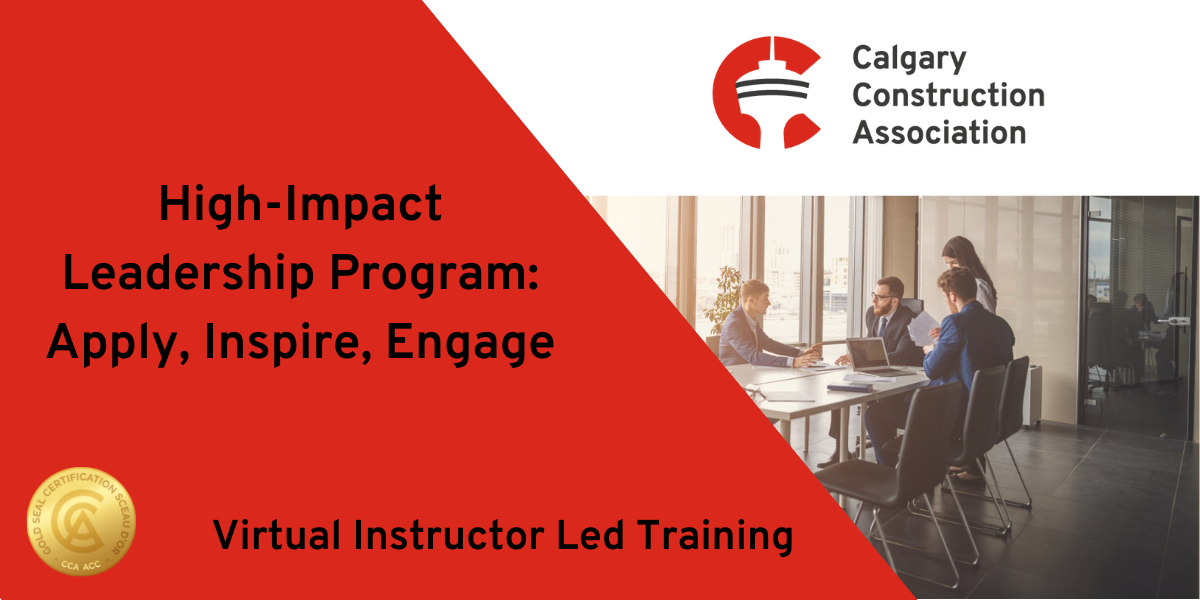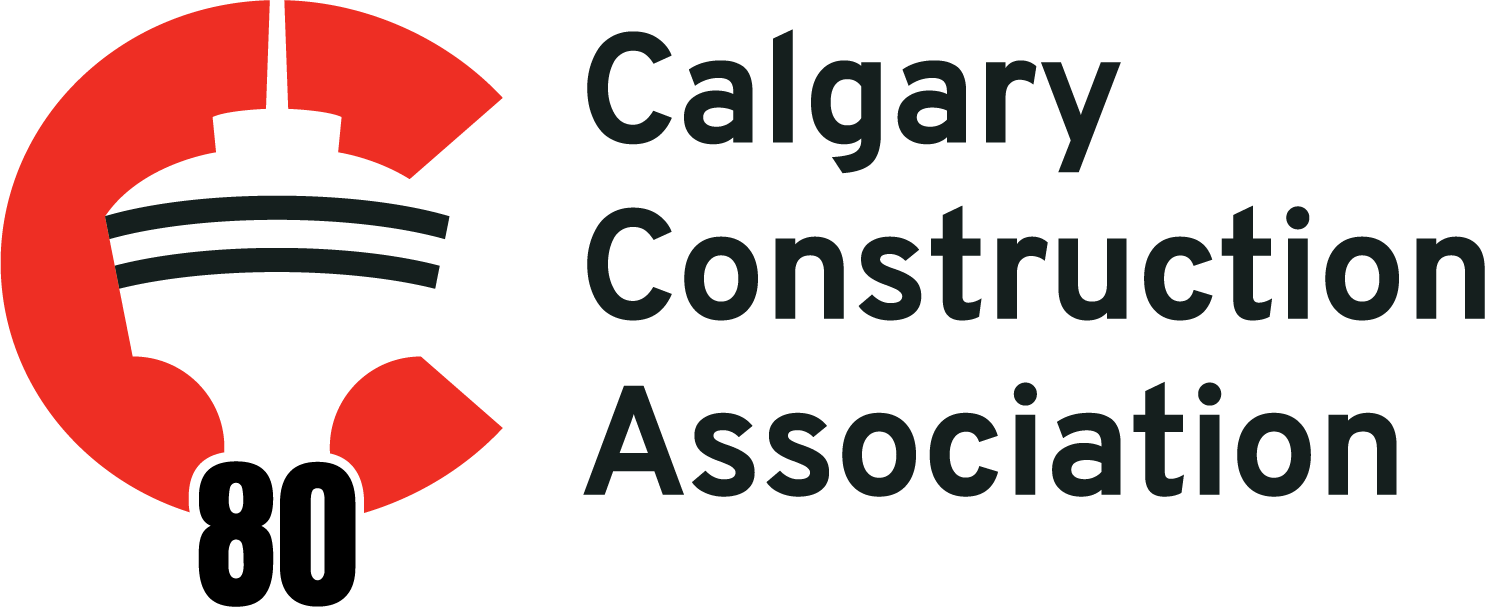
Companies with strong, healthy, cultures outperform their competitors. Company leaders, either on site or at the office, have a direct impact (for better or worse) on project performance, productivity, staff recruitment, and retention. Now is the time to invest in your key personnel and develop high-impact leadership in your team! This 6 week program is packed with practical tools and designed to help you apply what you learn in real-time, including one-on-one coaching sessions with your instructor (a Certified Executive Coach).
This course is worth 4 Gold Seal Credits
High-Impact Leadership will help you:
- Define Leadership
- Emotional Intelligences
- Strategic Communication & Coaching Mindset
- Building Your Team & Culture
- Leadership Strategy
- Leader’s Road Map
CCA Member $979 (+GST) Non-Member $1279 (+GST)
Additional Details
Companies with strong, healthy, cultures outperform their competitors. Company leaders, either on site or at the office, have a direct impact (for better or worse) on project performance, productivity, staff recruitment, and retention. Now is the time to invest in your most important assets and develop high-impact leadership in your key personnel!
This 6-week leadership program is packed with practical tools and designed to help you apply what you learn in real-time. Along with workshop learning, you’ll have two, one-on-one coaching sessions with your instructor (a Certified Executive Coach). These coaching sessions will provide you with space to work out how to put your new skills in action and trouble-shoot challenges, ask questions, and get support as you navigate a path forward in your role as a leader.
Your course instructor, Tony Healy, ‘gets’ the challenges of construction work and culture. His training style draws from a unique combination of construction expertise as an EH&S consultant, background as a multi-sport, nationally ranked athlete, and 15 years working as a professional high-performance coach in major-league rugby. Tony is passionate about helping others find the best in themselves, and as a trainer, he takes the most up-to-date theories and practices and boils them down to the essentials so that you can walk away from training ready to implement your new skills at the site or office right away.
6-Week Program Overview:
- 2 Individual Coaching sessions
- 6 Workshops
- Workshop 1: Defining Leadership
- Workshop 2: Emotional Intelligence
- Workshop 3: Strategic Communication & Coaching Mindset
- Workshop 4: Building Your Team & Culture
- Workshop 5: Leadership Strategy
- Workshop 6: Leader’s Road Map
Defining Leadership
As a leader, when you have clear values, vision, and mission, your purpose and engagement increase. These are tools that enable you to be more fully involved, focused, motivated, creative, and committed to your work. They also have a significant impact on the engagement of your team members and people around you, especially when framed in a clear, personal leadership philosophy.
Emotional Intelligence
Understanding how emotions impact behaviour, or Emotional Intelligence (EQ), is the most important skill a leader can have. In fact, research conducted by Harvard Business School found that as a success factor, EQ counted for twice as much as IQ and technical skills combined.
Communication Skills
Great leaders are great communicators – communication is at the core of a leader’s role. When a leader communicates with their team, they have the power to: clarify or confuse; motivate or demoralize; engage or enrage.
Building Team Culture
Companies with strong, healthy cultures outperform their competitors by a rate of at least 7 to 1. When your team has the appropriate amount of challenge and accountability, in the right conditions, the result is a collective effort that far exceeds the sum of its parts.
Leading Strategically
Strategic leaders understand the importance of using a variety of tools to measure past performance, current activity, where they want their team to go, the gap between, and factors that will undermine or limit success.
6-Week Program Overview:
- Program Orientation Session
- Workshop 1: Defining Leadership
- Individual Coaching: Session 1 (60 min)
- Workshop 2: Emotional Intelligence
- Workshop 3: Strategic Communication & Coaching Mindset
- Individual Coaching: Session 2 (60 min)
- Workshop 4: Building Your Team & Culture
- Workshop 5: Leadership Strategy
- Workshop 6: Leader’s Road Map
Detailed Program/Course Outline
ORIENTATION
Workshop topics include:
- Course Introductions & Program Outline
- Personal Coaching Sessions: overview, directions for booking calendar
- Systems Dynamics Primer
Upon completion of this orientation, you will be able to:
- Recognize the basic components of a system
- Describe basic system dynamics
WORKSHOP 1: Defining Leadership
There is not a one-size-fits-all way to lead. The aim of this workshop is to empower you to define your own leadership identity and path forward – tools that benefit you whether you are just getting started or have years of leadership experience.
Leadership is a journey. Like any journey, you need to prepare by first packing essential items, and then choose a path that will take you to your envisioned destination. As you begin your leadership journey it is important to know what matters to you, where you are, where you are going, and how you are going to get there.
When you have clear values, vision, and mission, your purpose and engagement increase. These are tools that enable you to be more fully involved, focused, motivated, creative, and committed to your work. They also have a significant impact on the engagement of your team members and people around you, especially when framed in a clear, personal leadership philosophy.
Workshop topics include:
- Who can be a leader?
- What kind of a leader (theory): Transactional vs. Transformational
- Building a Personal Leadership Foundation: Values, Vision, Mission
Upon successful completion of this workshop, you will be able to:
- Identify the qualities and behaviours associated with exemplary leadership
- Define and describe Transactional leadership models vs. Transformational leadership models
- Compare and contrast the differences between leadership theory approaches
- Identify and analyse your own personal values
- Design and construct your own personal vision and mission statements to inspire you and your team
WORKSHOP 2: Emotional Intelligence
Understanding how emotions impact behaviour, or Emotional Intelligence (EQ), is the most important skill a leader can have. In fact, research conducted by Harvard Business School found that as a success factor, EQ counted for twice as much as IQ and technical skills combined.
Emotions drive our actions. They are the mind and body’s way of communicating. They push us to respond to something that has happened, is happening, or could happen. Simply put, they are impulses to action – they move us. When emotions run high, they change the way our brain functions, affecting our cognitive abilities, decision-making powers, and even interpersonal skills.
Leaders who understand how to manage their emotions (and the emotions of others) differentiate themselves from average. They know how to maintain an even keel in the face of any storm, build relationships, motivate their team, disarm conflict, self-regulate, and achieve goals.
Leaders with EQ are better equipped to meet today’s workplace challenges and are set up for ongoing success in both their professional and personal lives.
Workshop topics include:
- Understanding our underlying (inter)personal feedback loops
- Basic neuroanatomy, physiology, emotional structures, and systems
- What is the purpose of emotions: Anatomy of an Emotional (amygdala) Hijacking
- Temperament (is not destiny nor our genes)
- Empathy
- Motivation: Intrinsic vs. extrinsic; Pros and cons of extrinsic rewards; Keys to unleashing intrinsic motivation (SDT, Drive)
- Building Rapport: creating positive reinforcing relational feedback loops
- Triple Focus for Leaders
Upon successful completion of this workshop, you will be able to:
- Explain how a feedback loop works
- Identify the major components of the human brain
- Identify the specific parts of the brain associated with emotion and reasoning
- Describe the role that chemistry has on the brain
- Explain the mechanics of an emotional hijacking and how to defuse it
- Describe the difference between Intrinsic and Extrinsic motivation
- Construct an increasingly engaging work environment in which all members can thrive
- Better manage your stress by applying mindfulness practices and meditation techniques
- Strengthen the connection in your relationships
- Increase resilience to setbacks and challenges
WORKSHOP 3: Strategic Communication & Coaching Mindset
Great leaders are great communicators – communication is at the core of a leader’s role. When a leader communicates with their team, they have the power to: clarify or confuse; motivate or demoralize; engage or enrage.
The most important thing a leader can do is ask the right questions and then listen attentively for the answers. The best leaders know how to effectively communicate vision, initiatives, tasks, ideas, and strategy to all levels of their organization. Simply put, leaders who know how to communicate inspire their people and they get S#!t done.
Workshop topics include:
- Defining a Coaching Mindset
- Strategic Communication:
- Communicating values, vision, and mission
- Communicating deliverables; up and down
- Coach-facilitator not dictator-micromanager
- Energize! Don’t demoralize!
- Strategic conversations: Individual and team feedback/feedforward; Coffee talk
- Strategic Negotiations: Employing a coach approach in business and daily negotiations
Upon successful completion of this workshop, you will be able to:
- Recognize the Communication Process Cycle
- Overcome common barriers to communication
- Describe the anatomy of a relationship
- Increase the clarity of your communication
- Employ active listening skills
- Use a coaching approach to illicit engagement and accountability
- Use reflection and reframing to change hot topics into cool topics
- Increase the accuracy and effectiveness of your feedback
- Motivate your team more effectively
- Increase productivity and retain top talent
WORKSHOP 4: Building Your Team & Culture
Companies with strong, healthy cultures outperform their competitors by a rate of at least 7 to 1. Teamwork is about people working together and discovering that their collective efforts far exceed the sum of their parts, while culture can be defined as a set of living relationships working toward a shared goal.
Team building and culture-building may sound like buzzwords to some people or mysterious and intangible to others. The truth is that real-world, concrete knowledge, tools, and techniques to get you started on building your teams and your culture exist and have been evolving for a long time.
Effective leaders know how to combine these tools, matching the right people, tools, and tasks. When your team has the appropriate amount of challenge and accountability, in the right conditions, the result amounts to unimagined levels of success.
Workshop topics include:
- Selecting Your Team: What you want, need, have, and what they can do
- Organizing Your Team: Getting your players into their best positions; Match strengths
- Embrace a Growth Mindset: Overcoming past perceived weaknesses; How to create stretch goals; Finding flow state; Cascading effects and synergies created
- Team Dynamics & Dysfunction: Relational feedback loops; Fundamental attribution error; Psychological safety; Conflict; Decision making; Accountability; CLEAR collective goals
Upon successful completion of this workshop, you will be able to:
- Identify the defining factors of what makes up a team – what, why and how
- Recognize the power of inter-relational feedback loops
- Counteract fundamental attribution error
- Combine inputs and group processes to empower the creation of an effective team
- Identify various stages of team evolution
- Use tools that help you select team members whose knowledge, skills, abilities, and personalities are in sync with the team’s mission
- Set clear, shared team goals
- Create a positive team culture
- Use a systematic approach to develop your people
- Resolve conflicts and use them to your advantage
- Build an engaged, action-oriented team
WORKSHOP 5: Leadership Strategy
Fail to plan = plan to fail. Strategic thinkers must be able to see the past and project the future, while maintaining a pulse on their team in the present. This skill gives leaders the ability to take wise risks, and achieve their team’s purpose, while avoiding mistakes of the past. They can link ‘Why we do what we do’ with ‘Where we want to be’, and ‘What sort of organization we want to be in the future.’
Strategic leaders involve themselves in five key activities:
- Direction setting
- Translating strategy into action
- Aligning the people and the organization to the strategy
- Determining effective intervention points
- Developing strategic capabilities
Strategic leaders understand the importance of using a variety of tools to measure past performance, current activity, where they want their team to go, the gap between, and factors that will undermine or limit success.
Workshop topics include:
- Concrete diagnostic tools to develop leadership measures
- Limits to success /growth: Definition/meaning and systems archetype model; Counteracting/action vs. Limits to growth
- Diagnostic tools: TWOS analysis; GAP analyses; 5 Whys; 1st 2nd & 3rd order impact/influence
- Providing and receiving feedback: Changing feedback to feedforward
- Debriefing lessons learned: Seeking constant improvement
- What is win-win? Reciprocity in the prisoner’s dilemma
- Transformational leadership strategies
Upon successful completion of this workshop, you will be able to:
- Identify critical risk factors
- Employ a variety of core strategic tools: SWOT, SOAR, and TOWS analyses
- Employ effective debriefing tools to analyse past failures and successes
- Explain the essential elements of Game Theory
- Apply leadership strategies and behaviours that support your values, vision, and mission
- Align people to the vision and strategy
- Attain strategic goals
- Overcome limits to success
- Maximize the potential of your team
- Translate vison and purpose into action
WORKSHOP 6: Leader’s Road Map
“Without knowledge action is useless and knowledge without action is futile.” – Abu Bakr
Individual, personal presentations of students’ personal roadmaps as they continue in their leadership journeys. Will be delivered via PowerPoint or other suitable media. Presentation length will vary by class-size.
Presentations will include:
- Written and verbal expression of each student’s individual values, vision, and mission statements
- Declaration as to how the student intends to lead
- Demonstration of the use of diagnostic tools that will promote growth and/or counteract limits to growth archetypes
- Leadership practices the student intends to implement, including their own personal details, tips, or insights
- Expression of personal growth or new insight that may have occurred through the course

Tony Healy, BA, CEC, President | Optimum Performance Coaching | EverydaySafe EHS Consulting Inc.
Tony is a Certified Executive Coach who is passionate about leadership coaching and draws on his broad experience in professional sports to deliver highly engaging training sessions. As an EH&S Consultant, he works with his clients to empower successful safety cultures by employing a coaching approach with their teams. Tony blends his construction expertise and experience with his background as a multi-sport, nationally ranked athlete and 15 years working as a professional, high-performance coach. This unique combination results in training that takes the most up-to-date leadership theories and practices and boils them down to the essentials so that you and your crew can walk away from a course ready to implement your new skills on site.
Please make sure you have the following:
- Computer or laptop with webcam: This course will involve on-screen interaction with your instructor and classmates, reading/viewing on-screen content like slides or videos, and interacting via typing with questions or responses. For this reason, we recommend that you have a full computer/laptop set-up and don’t recommend using a cell phone or tablet to attend the training.
A quiet space with minimal distractions: plan to be fully engaged in the class and clear your work schedule just as you would for attendance in an in-class program
Live, Online, Instructor-led training.
- This course is facilitated by the instructor on the Zoom platform. Access information will be provided to you in advance of the training.
- You will be expected to have your webcam on during the class and participate in group discussions and other activities with your instructor and classmates during the course.
- Full attendance and participation in all workshops and coaching sessions is mandatory for course completion. If a student misses a session, there is no option to transfer to a future course session or receive a partial refund of registration fees.
This course is delivered in partnership with local construction associations. You will be participating with a cohort of industry peers from multiple regions.
Cancellation Policy:
Payment is non-refundable for cancellations made within 5 business days of the course, or non-attendance on the day. Complimentary substitution of another member of your company is accepted. If CCA has to postpone or cancel courses due to insufficient enrolment, CCA will refund the registration fee or, if possible, the attendee may choose to move to an identical session in the future. Unless otherwise stated, every person able to see, hear, and observe the virtual course sessions must be a paid participant. Non-compliance of this requirement will result in removal from course. Refunds will not be issued to students who are removed from the course for non-compliance of this requirement.
CANADA – ALBERTA JOB GRANT
Did you know!! Eligible employers can get government funding to help employees access training opportunities. The Canada-Alberta Job Grant will give you up to 2/3 of the registration fee (up to $10,000/employee/fiscal year) for training. Whether taking one course or a combination of courses, the total training must be a minimum of 21 hours and be completed within 52 weeks.
